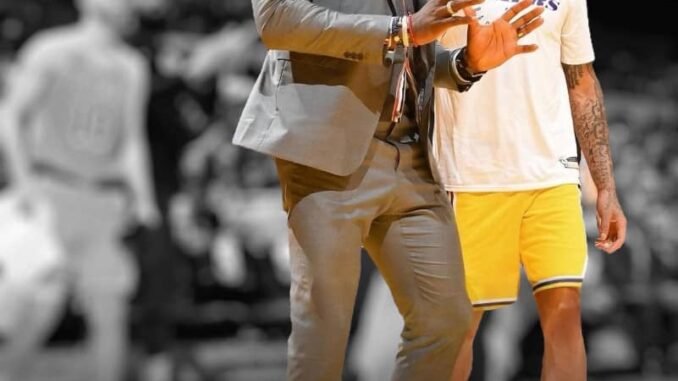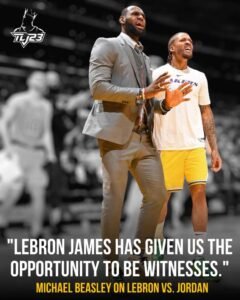
“We were witnesses”—Why Beasley says LeBron deserves more respect in the GOAT conversation.
The debate between Michael Jordan and LeBron James as the greatest basketball player of all time has dominated sports discourse for over a decade. Every statistic, every championship, and every moment has been dissected with obsessive detail. But recently, former NBA player Michael Beasley added a thoughtful, human layer to the conversation — one that shifts the focus from stats and rings to the stories we tell and the ones we conveniently leave out.
“They don’t talk about the negativity…”
Beasley starts his argument not by tearing down Jordan’s greatness, but by pointing out how selective memory has shaped the narrative. “With Michael Jordan they don’t talk about the negativity, the playoff losses, they don’t talk about the fact that he actively sought out Dennis Rodman, who was already a two-time champion,” he says.
He’s right. When we talk about Jordan, the image is airbrushed — six championships, six Finals MVPs, and a perfect Finals record. Rarely do we dwell on the fact that Jordan spent the first seven years of his career being eliminated by more experienced teams. We don’t often hear about the Bulls being swept in the first round or the years it took Jordan to overcome the Pistons’ “Bad Boys.” Instead, his journey is neatly packaged as relentless dominance, when in truth, it was a path of growth, defeat, and eventual triumph.
“He had to learn championship pedigree…”
Beasley touches on a key point: “They don’t tell the story of him having to learn championship pedigree.”
The 1990s Bulls dynasty wasn’t built on Jordan alone. It was a product of Phil Jackson’s leadership, the triangle offense, and crucial teammates like Scottie Pippen, Horace Grant, and later, Dennis Rodman — a defensive juggernaut and two-time champion with the Pistons.
Beasley’s point isn’t to diminish Jordan’s greatness but to humanize it. Greatness often involves setbacks, collaboration, and evolution. Jordan wasn’t born with a ring on his finger — he had to learn how to win. So did LeBron.
“We watch his good, his bad…”

This is where Beasley’s insight really cuts through: “LeBron James has given us the opportunity to be witnesses. We watch his good, his bad. We watch his ups, his downs…”
LeBron James entered the league as a teenager with the words “Chosen One” tattooed on his back and an entire generation watching. From Cleveland to Miami, back to Cleveland, and then to Los Angeles, his career has unfolded under constant scrutiny. Every Finals loss, every decision, every misstep — it’s all been public.
Unlike Jordan, whose legacy was solidified in an era with less 24/7 media coverage, LeBron has performed in the social media age, where every play is analyzed in real-time, and every failure is turned into a meme.
He didn’t get to control the narrative — we wrote it for him, in real time. And despite all of that, he’s still delivering 25 points, 8 rebounds, and 8 assists per game in his 21st season.
“To have the entire world inside his brain…”
Perhaps the most powerful line in Beasley’s statement is this: “The credit that we don’t give him is for him to have the entire world inside of his brain and still be able to give us 25-8-8.”
Think about that. LeBron James has carried not only the weight of expectations but the burden of constant public pressure. He’s been expected to lead, to win, to inspire — all while being a father, a businessman, and a role model. He’s never had the luxury of silence. And yet, he has continued to produce at an elite level for two decades.
The Value of Being Witnesses
Michael Beasley’s remarks remind us of something critical: while Jordan’s career has become legend, LeBron’s has been lived in the present tense. We’ve seen the tears after Finals losses, the iconic block in Game 7 of the 2016 Finals, the decision to take his talents to South Beach, and the return to Cleveland for a redemption story like no other.
We’ve seen it all. That kind of visibility doesn’t always inspire admiration — sometimes, it breeds fatigue. But it also offers something Jordan’s era didn’t: transparency.
We didn’t just see LeBron’s greatness. We saw his growth. We saw the pressure. And we saw him push through it all.
No Need to Choose a Villain
What Beasley’s words offer is not a demand to crown LeBron as the GOAT, but a plea for balance. Why do we treat Jordan’s story like scripture and LeBron’s like a never-ending trial? Why do we hide one man’s learning curve and magnify the other’s?
The reality is, both players are generational. Both changed the game. And both deserve the full truth told about their journeys — not just the parts that support our favorite argument.
Final Thoughts: The Evolving GOAT Conversation
Beasley’s take isn’t just a quote — it’s a challenge to all of us. A challenge to tell the whole story, not just the heroic parts. A challenge to stop comparing scars and start appreciating legacies.
Michael Jordan may be the GOAT for many, and rightly so. But as LeBron continues to defy time and expectation, maybe it’s time we rethink what greatness looks like — especially in the modern era.
If we are truly “witnesses,” as the Nike campaign once said, then maybe it’s time we start giving credit not just for the victories, but for the visibility, vulnerability, and volume of excellence LeBron has offered.
After all, greatness isn’t just measured in rings.
Sometimes, it’s measured in resilience.
Leave a Reply